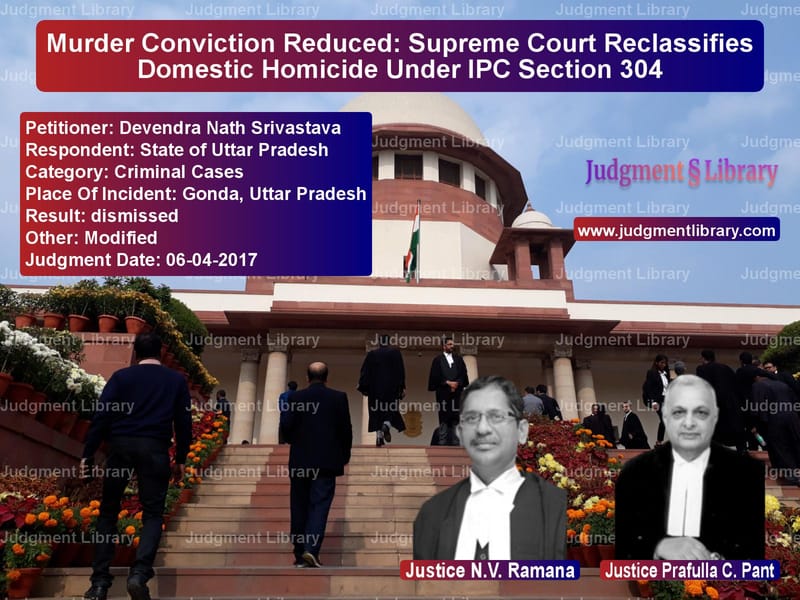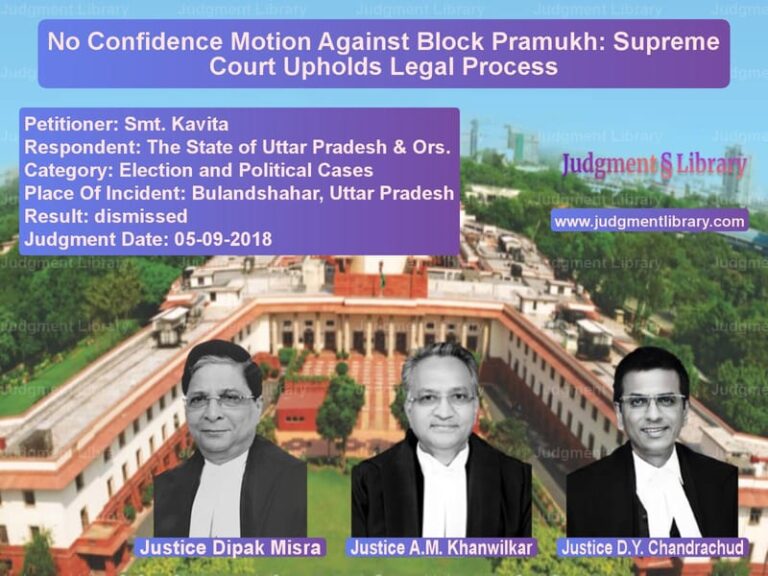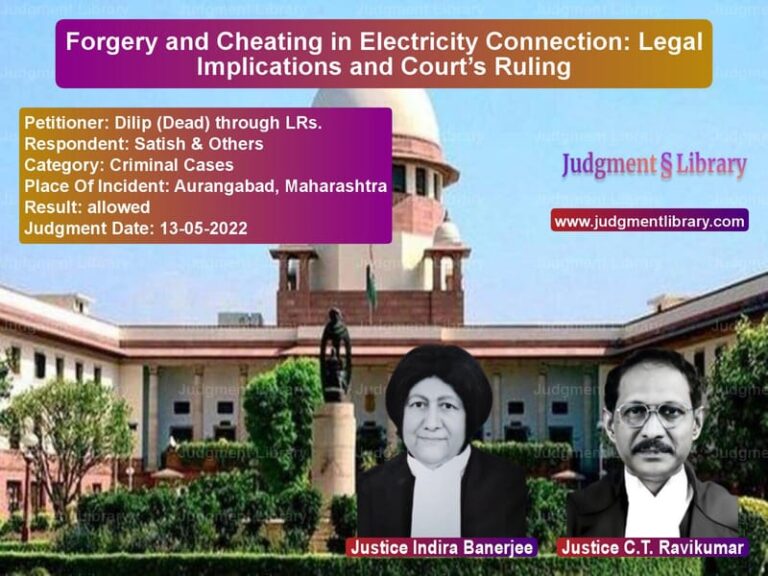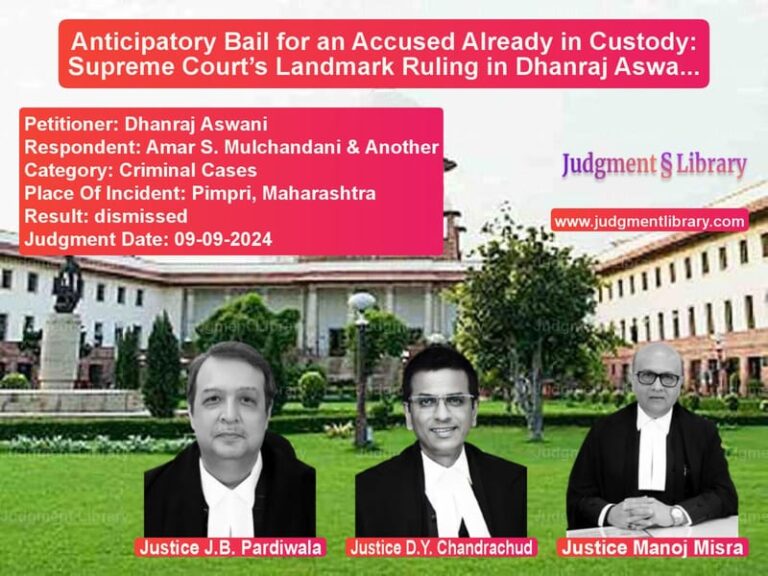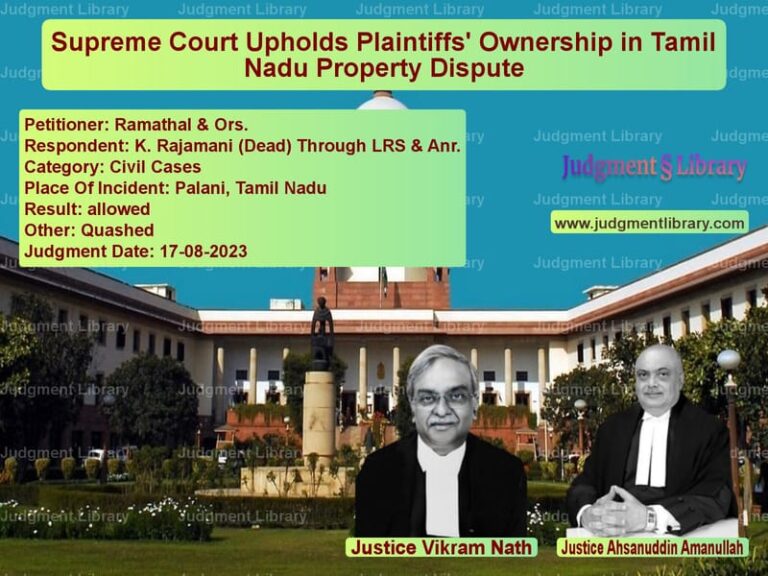Murder Conviction Reduced: Supreme Court Reclassifies Domestic Homicide Under IPC Section 304
The case of Devendra Nath Srivastava vs. State of Uttar Pradesh is a significant ruling addressing domestic violence and culpable homicide. The Supreme Court was tasked with determining whether the appellant’s conviction under Section 302 IPC (Murder) should be modified to Section 304 Part I IPC (Culpable Homicide Not Amounting to Murder), considering the nature of the crime and the circumstances under which it was committed.
The case originated from a domestic dispute, in which the appellant, Devendra Nath Srivastava, was accused of killing his wife, Madhu Srivastava. The trial court had sentenced him to death under Section 302 IPC, but the High Court later modified the conviction to Section 304 Part I IPC, sentencing him to 10 years of rigorous imprisonment. The Supreme Court, in its final ruling, reviewed the High Court’s decision and provided clarity on the application of culpable homicide in cases of sudden provocation.
Background of the Case
The appellant was married to the deceased, and the couple had four children. On May 12, 2005, at approximately 7:30 p.m., a key witness, Shailender Kumar Srivastava, heard the screams of the children and rushed to the house, where he witnessed the appellant assaulting his wife with a brick. Upon seeing neighbors and relatives approaching, the appellant fled the scene. Madhu Srivastava was rushed to the hospital but was declared dead upon arrival.
The First Information Report (FIR) was filed by Shailender Kumar Srivastava on the same night, at approximately 9:45 p.m. The post-mortem report revealed multiple ante-mortem injuries and asphyxia due to strangulation as the cause of death. The police arrested the appellant, and the brick used in the crime, along with his blood-stained clothes, was recovered during the investigation.
Trial Court Judgment
The trial court convicted the appellant under Section 302 IPC and sentenced him to death. The prosecution presented multiple pieces of evidence, including:
- Eyewitness testimony confirming that the appellant was seen assaulting his wife.
- Medical reports confirming that the victim suffered severe head injuries and strangulation.
- The recovery of a blood-stained brick and the accused’s clothes, which matched the blood type of the deceased.
The trial court ruled that there was no provocation from the deceased and that the crime was brutal and deliberate. As a result, the appellant was sentenced to death.
High Court Judgment
The appellant appealed to the Allahabad High Court, which modified the conviction on the following grounds:
- The incident occurred in the heat of the moment following a domestic dispute.
- The appellant was under the influence of alcohol at the time of the crime.
- The act was not premeditated, making it a case of culpable homicide not amounting to murder.
- Considering the lack of pre-planning, the conviction was modified to Section 304 Part I IPC, and the sentence was reduced to 10 years of rigorous imprisonment with a fine of ₹10,000.
Supreme Court Judgment
Both the appellant and the victim’s sister, Preeti Srivastava, challenged the High Court’s decision. The appellant sought complete acquittal, while the victim’s sister demanded the reinstatement of the murder conviction under Section 302 IPC.
The Supreme Court, comprising Justices N.V. Ramana and Prafulla C. Pant, upheld the High Court’s ruling with the following observations:
- The prosecution successfully proved that the appellant caused the homicidal death of his wife.
- However, the crime was committed in a fit of rage after a heated argument, rather than being pre-planned.
- The appellant had a known history of alcohol abuse and domestic violence.
- There was no evidence of a planned motive to kill his wife.
- Given these circumstances, the conviction under Section 304 Part I IPC and the sentence of 10 years of rigorous imprisonment was justified.
Key Excerpts from the Judgment
The Supreme Court cited legal precedents on culpable homicide vs. murder, stating:
“Every murder is culpable homicide, but not every culpable homicide is murder. The distinction depends on the degree of intention and premeditation.”
Regarding provocation, the Court observed:
“The accused acted in a fit of anger following a domestic altercation. The absence of premeditation justifies reducing the charge to Section 304 Part I IPC.”
Legal Precedents Considered
The Supreme Court referenced several landmark cases while delivering its ruling:
- State of Andhra Pradesh v. Rauavarapu Punnayya (1977) – Establishing that culpable homicide is a broader category than murder.
- K.M. Nanavati v. State of Maharashtra (1962) – Discussing sudden provocation as a mitigating factor.
- Sukhbir Singh v. State of Haryana (2002) – Holding that alcohol intoxication can contribute to a crime of passion.
Implications of the Judgment
- The ruling highlights the importance of distinguishing between murder and culpable homicide.
- It reinforces that provocation and lack of premeditation can reduce the severity of charges.
- The judgment sets a precedent for domestic violence cases where intent is disputed.
- It reaffirms that capital punishment should be reserved for premeditated murders.
Conclusion
The Supreme Court’s ruling in Devendra Nath Srivastava vs. State of Uttar Pradesh serves as an important precedent in domestic homicide cases. While affirming the conviction, the Court acknowledged the role of circumstantial provocation and ensured that justice was served with proportionality in sentencing.
Don’t miss out on the full details! Download the complete judgment in PDF format below and gain valuable insights instantly!
Download Judgment: Devendra Nath Srivas vs State of Uttar Prade Supreme Court of India Judgment Dated 06-04-2017.pdf
Direct Downlaod Judgment: Direct downlaod this Judgment
See all petitions in Murder Cases
See all petitions in Attempt to Murder Cases
See all petitions in Custodial Deaths and Police Misconduct
See all petitions in Judgment by N.V. Ramana
See all petitions in Judgment by Prafulla C. Pant
See all petitions in dismissed
See all petitions in Modified
See all petitions in supreme court of India judgments April 2017
See all petitions in 2017 judgments
See all posts in Criminal Cases Category
See all allowed petitions in Criminal Cases Category
See all Dismissed petitions in Criminal Cases Category
See all partially allowed petitions in Criminal Cases Category

